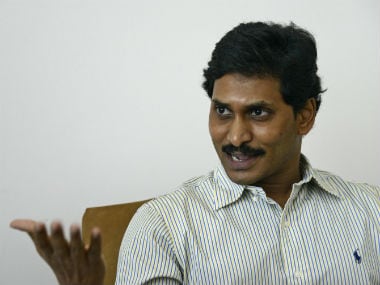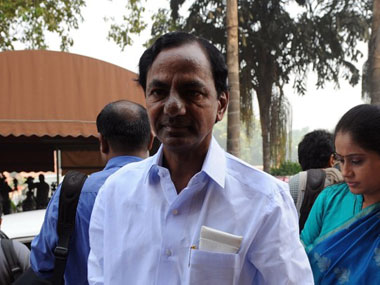The ruling dispensations in Telangana and Andhra Pradesh have defanged and neutralised the mainstream media in the Telugu states. The latest development in this alarming trend is the recent arrest and imprisonment of a journalist-CEO of a major media house. The disquieting incident has not caused any discernible consternation among the public or in the press corps for a variety of reasons. V Ravi Prakash, the sacked CEO of Associated Broadcasting Company Pvt Ltd (ABCPL) that runs a bouquet of highly successful news channels in various languages including TV9 Telugu, TV9 Kannada and TV9 Gujarati, was arrested and jailed on 5 October by the Telangana Police on a complaint by the new owners of the company Alanda Media. The absence of concern in the aftermath of the arbitrary action is due to another worrying phenomenon — the growing public disenchantment with the shenanigans of the media promoters such as Prakash himself. Despite the fact that Prakash is being hounded at the behest of political interests (at least in the present case), few have come to his defence because of the controversial nature of his media practices. [caption id=“attachment_5129421” align=“alignleft” width=“380”] File image of K Chandrashekar Rao. AFP[/caption] While his media venture ABCPL, bankrolled by Ch Srinivasa Raju of Chinatalapati Holdings, has been wildly successful, the achievement came out of his own brand of sensational, provocative and voyeuristic journalism.The media house also attracted allegations of blackmail and extortion quite often since the launch of its debut channel TV9 Telugu in 2004. Considered a faux progressive by many, Prakash was also seen as cantankerous by political parties of all hues, especially the ruling ones. Both Telangana chief minister K Chandrashekar Rao and Andhra Pradesh chief minister YS Jaganmohan Reddy have never concealed their antipathy to the channel in general and Prakash in particular. It was in this backdrop that ABCPL was acquired by Alanda Media and Entertainments Pvt Ltd in August 2018. Alanda Media was floated by Jupally Rameshwara Rao, a real estate developer who owns the My Home Group. He is known to be thick with the Telangana chief minister, on whose recommendation he was recently appointed as Tirumala Tirupati Devasthanam Trust Board member by Andhra Pradesh government. Rao owns 62 percent of Alanda Media, while PV Krishna Reddy, the managing director of infra giant Megha Engineering and Infrastructure Limited (Meil) holds 38 percent of the company. Megha Engineering is constructing big-ticket projects like Kaleshwaram Irrigation Project in Telangana and its promoter Krishna Reddy is known to be close to KCR. It is significant that Alanda Media acquired a majority stake in ABCPL in August 2018 before the Telangana Assembly election. Following this, it nominated four directors on the board of ABCPL. Prakash, who owns a nine percent stake in the company, was alleged to have failed to file the details with the Registrar of Companies confirming the appointment, leading to mutual recriminations and sacking of the promoter-CEO from the company. On a complaint by the new management, the police registered two cases against Prakash last May on charges of forgery, cheating and criminal conspiracy and questioned him at length. At the time, Prakash called the new promoters “representatives of political honchos who are out there to devour every journalist and independent media house today”. Prakash had alleged that Krishna Reddy was used as a front for the takeover of ABCPL, and Rameshwara Rao came into the picture through the backdoor. He also claimed that he had fiercely resisted Rao’s editorial interference over issues such as Congress leader Revanth Reddy’s arrest and intermediate results scam, which resulted in his ouster. The latest arrest was based on a fresh complaint by a director of the company alleging that Prakash and his associates had drawn an amount of Rs 18.31 crore without authorisation. Prakash was taken from his residence on the morning of 5 October by the police and was arrested later in the evening. While the allegations of misappropriation against Prakash will be decided in court, the alacrity with which the police has been pursuing every single complaint by the new management of TV9 is rather unusual. It is especially so because the dispute over management control is being heard in National Company Law Tribunal (NCLT). More significantly, the acquisition of TV9, home to the number one Telugu news channel in audience ratings, at a crucial time was no accident of business. It was clearly a part of the plan to tilt the media scale in the KCR government’s favour. KCR had famously warned in his earlier stint that he would bury critical media “10 kilometres inside the Earth”. The chief minister had also imposed an unofficial ban in his first term on TV9, along with ABN Andhra Jyothy, in Telangana for caustic attacks on his government. KCR’s supporters now own half the media in the Telugu states. His family members floated Namasthe Telangana newspaper, Telangana Channel and Telangana Today English newspaper, while his close associates Jupally Rameshwara Rao and Krishna Reddy own fully or partially at least three top-rated channels, TV9, NTV and TV10. This has effectively curbed adversarial writing against the government in Telangana. Taking a leaf out of KCR’s book, Jagan Reddy, on the day he took his oath as chief minister, issued an ultimatum to three media houses — Eenadu, TV5 and ABN Andhra Jyothy — against carrying ‘motivated’ reports on the new government. While TV9 has been spared the ire of Jagan’s government in view of the channel being taken over by his friends in the neighbouring government, TV5 and ABN Andhra Jyothy were yanked off the air in Andhra Pradesh soon after. [caption id=“attachment_4362181” align=“alignright” width=“380”]
 File image of Jaganmohan Reddy. Reuters[/caption] Recently on a complaint, the TDSAT ordered the restoration of TV5 on the state-owned Fibernet cable, and when the Andhra Pradesh government failed to do so, imposed a fine of Rs five lakh. The tribunal also stipulated that continuing contravention would attract a levy of Rs two lakh per day on the state government. Jagan, like his Telangana counterpart, also relies mostly on his own media empire for his political propaganda. His Sakshi newspaper is the second-largest circulated in Telugu states, while Sakshi news channel is available on every platform. Both KCR and Jagan have also made no bones about calling any media outlet critical of their regimes their enemies and treating them publicly as such. As a result, most of the leading newspapers, including the national papers published from Hyderabad, are wary of making strong comments against the governments. While KCR periodically targets censorious papers as the ‘anti-Telangana’ press, Jagan’s Man Friday and YSR Congress parliamentary party leader Vijayasai Reddy regularly castigates unsparing media as ‘yellow media’, an innuendo for allegedly being pro-TDP. Eenadu and Andhra Jyothy newspapers are traditionally seen as TDP sympathisers, and both KCR and Jagan have targeted both papers on many an occasion in the past. Vijayasai Reddy, in his capacity as Rajya Sabha MP, has now written a letter to the Chief Justice of India requesting a CBI inquiry into alleged money laundering overseas by Ravi Prakash. Interestingly, Reddy himself is accused number two in the ongoing CBI cases against Jagan. While both the chief ministers have been very generous in placing government advertisements in their family-owned media houses without any sense of conflict of interest, they also have been particularly antagonistic towards their ’enemy’ newspapers by denying them government ads. For example, Jagan issued Rs five crore worth of advertisements on the day of his oath, out of which he liberally gave Rs two crore to his own media outlet. The rest was distributed among six English newspapers and eight Telugu newspapers. Observers say that both the governments are bent on starving the mainstream media organisations without financial support while taking care of their family-owned media houses. Simultaneously, they are also resorting to obstructing the media, especially the TV channels by controlling the cable operators, and in some extreme cases, dragging the press into police cases. As a result, it has become imperative for media houses in Telugu states to seek the active support of a political party to remain in the field. When V Radhakrishna, journalist-owner of Andhra Jyothy group, prominently published a picture of his recent meeting with BJP leader and Union Home Minister Amit Shah in Delhi, it was intended to act as a dampener against the hostility of both KCR and Jagan against the group, which runs a newspaper and a TV channel. With political parties taking over the media in a big way, independent media outlets seem to have little chance of surviving in the Telugu states in the coming days. The author is a Hyderabad-based journalist
File image of Jaganmohan Reddy. Reuters[/caption] Recently on a complaint, the TDSAT ordered the restoration of TV5 on the state-owned Fibernet cable, and when the Andhra Pradesh government failed to do so, imposed a fine of Rs five lakh. The tribunal also stipulated that continuing contravention would attract a levy of Rs two lakh per day on the state government. Jagan, like his Telangana counterpart, also relies mostly on his own media empire for his political propaganda. His Sakshi newspaper is the second-largest circulated in Telugu states, while Sakshi news channel is available on every platform. Both KCR and Jagan have also made no bones about calling any media outlet critical of their regimes their enemies and treating them publicly as such. As a result, most of the leading newspapers, including the national papers published from Hyderabad, are wary of making strong comments against the governments. While KCR periodically targets censorious papers as the ‘anti-Telangana’ press, Jagan’s Man Friday and YSR Congress parliamentary party leader Vijayasai Reddy regularly castigates unsparing media as ‘yellow media’, an innuendo for allegedly being pro-TDP. Eenadu and Andhra Jyothy newspapers are traditionally seen as TDP sympathisers, and both KCR and Jagan have targeted both papers on many an occasion in the past. Vijayasai Reddy, in his capacity as Rajya Sabha MP, has now written a letter to the Chief Justice of India requesting a CBI inquiry into alleged money laundering overseas by Ravi Prakash. Interestingly, Reddy himself is accused number two in the ongoing CBI cases against Jagan. While both the chief ministers have been very generous in placing government advertisements in their family-owned media houses without any sense of conflict of interest, they also have been particularly antagonistic towards their ’enemy’ newspapers by denying them government ads. For example, Jagan issued Rs five crore worth of advertisements on the day of his oath, out of which he liberally gave Rs two crore to his own media outlet. The rest was distributed among six English newspapers and eight Telugu newspapers. Observers say that both the governments are bent on starving the mainstream media organisations without financial support while taking care of their family-owned media houses. Simultaneously, they are also resorting to obstructing the media, especially the TV channels by controlling the cable operators, and in some extreme cases, dragging the press into police cases. As a result, it has become imperative for media houses in Telugu states to seek the active support of a political party to remain in the field. When V Radhakrishna, journalist-owner of Andhra Jyothy group, prominently published a picture of his recent meeting with BJP leader and Union Home Minister Amit Shah in Delhi, it was intended to act as a dampener against the hostility of both KCR and Jagan against the group, which runs a newspaper and a TV channel. With political parties taking over the media in a big way, independent media outlets seem to have little chance of surviving in the Telugu states in the coming days. The author is a Hyderabad-based journalist
The ruling dispensations in Telangana and Andhra Pradesh have defanged and neutralised the mainstream media in the Telugu states
Advertisement
End of Article


)
)
)
)
)
)
)
)
)



